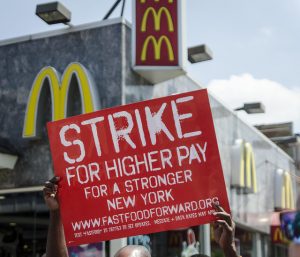Posted in Employment Law, Uncategorized

California’s highest court reversed an appeals-court decision which stated whether Domino’s Pizza could be held liable for alleged sexual harassment of an employee by a supervisor should be decided by a jury, according to Forbes magazine. While Domino’s pays close attention to how its franchisees run their stores, the state Supreme Court wrote, it’s not an employer if it doesn’t control who works in the stores.
The decision is consistent with past rulings but the Obama administration is seeking to hold franchisors like McDonald’s liable for labor practices at thousands of independently owned franchised stores. The NLRB’s general counsel ruled in July that McDonald’s is a joint employer with its franchisees, meaning it could be liable for unfair labor practices against striking workers. The decision, if upheld, would be a boost to labor unions who want to use the threat of NLRB sanctions to help organize the fast-food industry.
Simply being a franchisor will not be bullet proof protection against employment claims from franchisee employees. The more oversight and direction a franchisor gives to the employment actions of a franchisee, the more it acts like an employer, the thinner that legal shield becomes. The dissent in the Supreme Court’s decision in the Domino’s case pointed out there was evidence a local Domino’s franchising manager urged the franchise operator to fire another employee who’d delivered non-Domino’s products in the company’s bags.
The NLRB general counsel’s office also has intervened in a case against Browning-Ferris where the Teamsters are trying to pull the waste-handling company into unionization negotiations with a subcontractor at a California recycling plant. According to another Forbes article, the Obama administration states in a brief on the case: The definition of “joint employer” should be loosened to include any company that “wields significant influence over the working conditions” at an employer.
The NLRB states the traditional definition should be enlarged because “it undermines the fundamental policy” of federal labor laws, which is “to encourage stable and meaningful collective bargaining,” the brief states. Falling under this broader definition could be franchisors and businesses that have significant influence over wages and working conditions with “cost plus” contracts with subcontractors.
The administration’s favored “industrial realities” of other businesses could dictate who is liable for labor-law compliance and plaintiffs’ attorneys could try to leverage that new standard to find new defendants with deeper pockets for verdicts in employment law cases such as discrimination, wage and hour and wrongful termination.
Both franchisors and franchisees are having the legal ground beneath them shaken by evolving laws and judicial decisions. If you are either a franchisor or franchisee and you have questions about franchise law and its impact on your situation, call my office.
